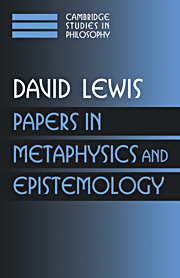Book contents
- Frontmatter
- Contents
- Introduction
- 1 New work for a theory of universals
- 2 Putnam's paradox
- 3 Against structural universals
- 4 A Comment on Armstrong and Forrest
- 5 Extrinsic properties
- 6 Defining ‘intrinsic’ (with Rae Langton)
- 7 Finkish dispositions
- 8 Noneism or allism?
- 9 Many, but almost one
- 10 Casati and Varzi on holes (with Stephanie Lewis)
- 11 Rearrangement of particles: Reply to Lowe
- 12 Armstrong on combinatorial possibility
- 13 A world of truthmakers?
- 14 Maudlin and modal mystery
- 15 Humean Supervenience debugged
- 16 Psychophysical and theoretical identifications
- 17 What experience teaches
- 18 Reduction of mind
- 19 Should a materialist believe in qualia?
- 20 Naming the colours
- 21 Percepts and color mosaics in visual experience
- 22 Individuation by acquaintance and by stipulation
- 23 Why conditionalize?
- 24 What puzzling Pierre does not believe
- 25 Elusive knowledge
- Index
17 - What experience teaches
Published online by Cambridge University Press: 08 February 2010
- Frontmatter
- Contents
- Introduction
- 1 New work for a theory of universals
- 2 Putnam's paradox
- 3 Against structural universals
- 4 A Comment on Armstrong and Forrest
- 5 Extrinsic properties
- 6 Defining ‘intrinsic’ (with Rae Langton)
- 7 Finkish dispositions
- 8 Noneism or allism?
- 9 Many, but almost one
- 10 Casati and Varzi on holes (with Stephanie Lewis)
- 11 Rearrangement of particles: Reply to Lowe
- 12 Armstrong on combinatorial possibility
- 13 A world of truthmakers?
- 14 Maudlin and modal mystery
- 15 Humean Supervenience debugged
- 16 Psychophysical and theoretical identifications
- 17 What experience teaches
- 18 Reduction of mind
- 19 Should a materialist believe in qualia?
- 20 Naming the colours
- 21 Percepts and color mosaics in visual experience
- 22 Individuation by acquaintance and by stipulation
- 23 Why conditionalize?
- 24 What puzzling Pierre does not believe
- 25 Elusive knowledge
- Index
Summary
EXPERIENCE THE BEST TEACHER
They say that experience is the best teacher, and the classroom is no substitute for Real Life. There's truth to this. If you want to know what some new and different experience is like, you can learn it by going out and really having that experience. You can't learn it by being told about the experience, however thorough your lessons may be.
Does this prove much of anything about the metaphysics of mind and the limits of science? I think not.
Example: Skunks and Vegemite I have smelled skunks, so I know what it's like to smell skunks. But skunks live only in some parts of the world, so you may never have smelled a skunk. If you haven't smelled a skunk, then you don't know what it's like. You never will, unless someday you smell a skunk for yourself. On the other hand, you may have tasted Vegemite, that famous Australian substance; and I never have. So you may know what it's like to taste Vegemite. I don't, and unless I taste Vegemite (what, and spoil a good example!), I never will. It won't help at all to take lessons on the chemical composition of skunk scent or Vegemite, the physiology of the nostrils or the tastebuds, and the neurophysiology of the sensory nerves and the brain.
Example: The Captive Scientist. Mary, a brilliant scientist, has lived from birth in a cell where everything is black or white. (Even she herself is painted all over.) She views the world on black-and-white television.
- Type
- Chapter
- Information
- Papers in Metaphysics and Epistemology , pp. 262 - 290Publisher: Cambridge University PressPrint publication year: 1999
- 27
- Cited by

